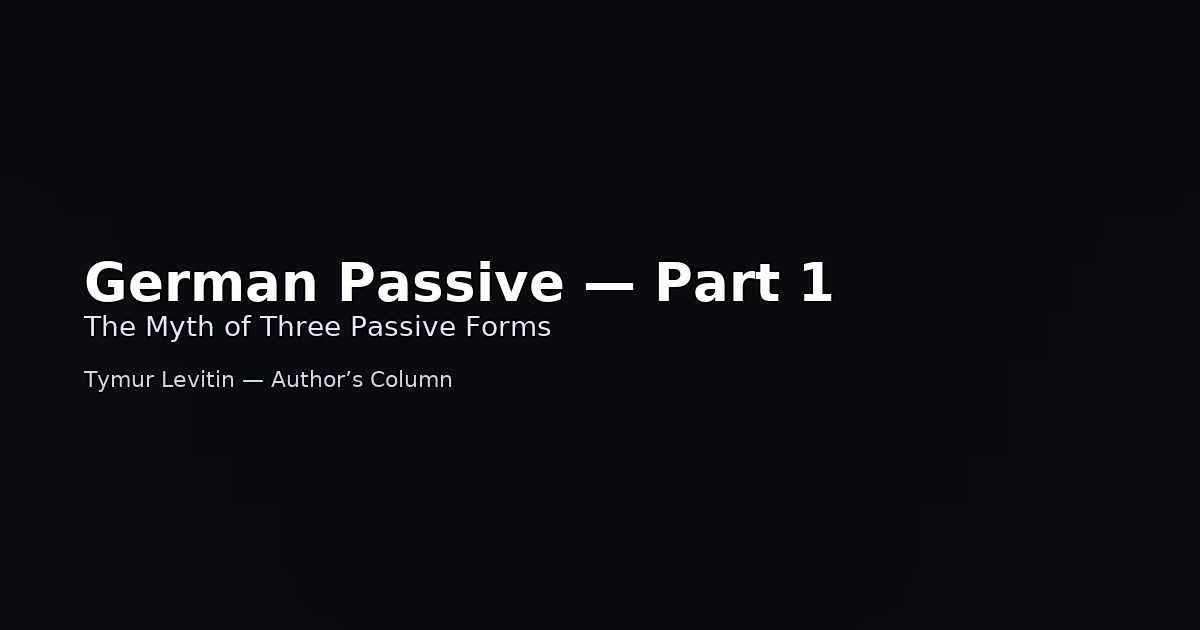The Myth of “Three Passive Forms”
“Grammar is not a set of tricks; it’s the shape of meaning.”
— (Author’s Column by Tymur Levitin)
Why this series
Most textbooks stop at a tiny island: werden-Passive in Präsens/Präteritum and, at best, Perfekt. Sometimes you see Zustandspassiv (sein + Partizip II). Almost nobody shows what happens in all tenses, with Modalverben, in Konjunktiv, Futur II, or borderline “academic but legal” combinations. This series is your map of the whole archipelago — theory, usage, and survival.
Terminology map (don’t get lost)
Different grammars use different labels. Here is a clean alignment so students don’t confuse terms:
- Vorgangspassiv (aka werden-Passiv, eventive/process passive):
Das Auto wird repariert. → “The car is being repaired” (process/event). - Zustandspassiv (aka sein-Passiv, resultative/state passive):
Das Auto ist repariert. → “The car is repaired / in a repaired state.” - Rezipientenpassiv (aka bekommen/kriegen-Passiv, recipient passive):
Er bekommt das Auto repariert. → “He gets the car repaired.” (focus on recipient) - Modaler Passivgebrauch (Passive + Modalverb):
Das Auto kann repariert werden. → “The car can be repaired.”
In Perfekt with modals: Das Auto hat repariert werden können. - Unpersönliches Passiv (Impersonal passive):
Es wird getanzt. → “There is dancing.” (no concrete agent) - Ersatzkonstruktionen that behave “as if passive” in usage:
Das lässt sich lösen. / Das ist zu machen. (modal meaning, not a true Passive morphology, but functional equivalents in style/semantics)
⚠️ Common mishearings:
"Sustained passive” → Zustandspassiv (state/result).
"Fragrance Passive” → Vorgangspassiv (sounds similar to Vorgang).
The three textbook shapes — and why they aren’t enough
1) Vorgangspassiv (werden-Passive)
- Präsens: Das Auto wird repariert.
- Präteritum: Das Auto wurde repariert.
- Perfekt: Das Auto ist repariert worden.
- Plusquamperfekt: Das Auto war repariert worden.
- Futur I: Das Auto wird repariert werden.
- Futur II: Das Auto wird repariert worden sein.
Meaning: an event/process happens to the subject (agent may be omitted or added with von).
Usage tip: This is the “workhorse” passive in news, reports, and formal writing.
2) Zustandspassiv (sein-Passive)
- Präsens: Das Auto ist repariert.
- Präteritum: Das Auto war repariert.
- Perfekt: Das Auto ist repariert gewesen.
- Plusquamperfekt: Das Auto war repariert gewesen.
- Futur I: Das Auto wird repariert sein.
- Futur II: (rare) Das Auto wird repariert gewesen sein.
Meaning: a resulting state (already repaired), not the process.
Typical contexts: status reports, inventory/quality control, finished tasks.
3) Rezipientenpassiv (bekommen/kriegen-Passive)
- Präsens: Er bekommt das Auto repariert.
- Präteritum: Er bekam das Auto repariert.
- Perfekt: Er hat das Auto repariert bekommen.
…
Meaning: the recipient is in focus (“he gets/has it done”). Colloquial to neutral; erhalten is more neutral than kriegen.
Passive + modal verbs: the real gap
Unter Präsens/Präteritum everything is clean:
- Das Auto kann repariert werden.
- Das Auto konnte repariert werden.
Unter Perfekt/Plusquamperfekt, standard German uses the Ersatzinfinitiv chain:
- Perfekt: Das Auto hat repariert werden können.
- Plusquamperfekt: Das Auto hatte repariert werden können.
Why not ist repariert worden können? Because in German you don’t build a double-auxiliary perfect with the modal’s participle here; the language resolves it via an infinitive chain. (We’ll go deep into proofs, alternatives, edge-cases and exam notes in Part 3.)
Translation pitfall:
Russian/Ukrainian/English often flatten this to a simple perfective idea (“could be repaired / удалось отремонтировать / вдалося відремонтувати”), hiding German’s internal mechanics. You must keep the process vs state distinction in mind when back‑translating.
Cross‑language reality check (EN–DE–RU–UK)
- EN → “The car was repaired.”
- DE → Event/process: Das Auto wurde repariert. / State: Das Auto ist repariert.
- RU → «Машину отремонтировали.» / «Машина отремонтирована.»
- UK → «Автомобіль відремонтовано.» / «Автомобіль відремонтований.»
Key insight: RU/UK/EN often don’t force you to choose between process und state — German does. This is where Zustandspassiv vs Vorgangspassiv becomes more than “terms”: it’s meaning.
When theory meets usage
- Allowed vs. preferred. Many “monstrous” shapes are grammatical but avoided in speech. For exams and academic writing you must (a) recognize them, (b) know how to form them, (c) be able to paraphrase to a cleaner alternative if style requires.
- Agent suppression. Passive lets you omit responsibility (Es wurde entschieden …). In law, business and science that’s a feature — but be aware of clarity vs accountability.
Series navigation
- Part 1 (this page): The Myth of Three Passive Forms
- Part 2: Vorgangspassiv vs Zustandspassiv — form, meaning, traps
- Part 3: Passive + Modals (incl. Perfekt/Plusquamperfekt with Ersatzinfinitiv)
- Part 4: All Tenses in Full: from Präsens to Futur II (with tables)
- Part 5: Recipient Passive (bekommen/kriegen) — ranges from colloquial to formal
- Part 6: Impersonal Passive and agentless style: how German hides the doer
- Part 7: Konjunktiv I/II in Passive — report, hypothesis, counterfactual
- Part 8: Passive in exams and academic writing: what’s acceptable, what’s preferred
- Part 9: Translation lab: German passive across English/Russian/Ukrainian/Spanish
- Part 10: Survival Passive: rewrite strategies when the “monster” appears
(Every part will include: minimal theory → full paradigm tables → usage notes → cross‑language translation → survival rewrites.)

Kategorie: German Grammar Deep Dive
Useful links & author
- Autor: Tymur Levitin — Founder & Head Teacher https://levitinlanguageschool.com/teachers/tymur-levitin/.
- School pages:
- Levitin-Sprachschule — main site: https://levitinlanguageschool.com/
- Start Language School by Tymur Levitin (USA site): https://languagelearnings.com/
- Wählen Sie Ihre Sprache: https://levitinlanguageschool.com/#languages
- German study page (international): https://levitinlanguageschool.com/studying-german-easy/
- German on the USA site: https://languagelearnings.com/german/
© Tymur Levitin — Founder, Director & Head Teacher of Levitin-Sprachschule (Start Language School by Tymur Levitin). Globales Lernen. Persönliche Herangehensweise.
























